#orthography
Explore tagged Tumblr posts
Text
When a piece of media's title consists of the names of its two leads, I feel like it makes a difference whether those names are conjoined with an ampersand, or whether they write out "and" in full. "A & B" versus "A and B" – these are fundamentally different species.
3K notes
·
View notes
Text
my hottest english spelling reform take is that I think it would be a good idea to replace wh with qh. it would be really elegant to have ph th ch qh as a set analogous to p t c q(u)
1K notes
·
View notes
Text
Lexember (December 18th)


Today's Valyrian glyph is tegon "earth". I could've sworn I did this one already; it's so common. Common as dirt. It's a bit like grass standing out of the dirt, this one. Kind of like this: 𓏠. That's the glyph for "land" in Egyptian hieroglyphs. I love those goofy hieroglyphs. Sometimes they're basic af. Like "This rectangle with lines is land." Then sometimes it's like:
𓅸
BOWL OF DUCKIES HAVING A LITTLE BATH!!! SPLISHY-SPLASH!
HV glyphs have that energy sometimes, honestly. Like the glyph for "foot". lol Clodhopper...
#conlang#language#game of thrones#hbo#valyrian#high valyrian#orthography#got#hotd#house of the dragon#lexember
456 notes
·
View notes
Text

Source
384 notes
·
View notes
Text
Interior Department Announces New Guidance to Honor and Elevate Hawaiian Language

"In commemoration of Mahina ʻŌlelo Hawaiʻi, or Hawaiian Language Month, and in recognition of its unique relationship with the Native Hawaiian Community, the Department of the Interior today announced new guidance on the use of the Hawaiian language.
A comprehensive new Departmental Manual chapter underscores the Department’s commitment to further integrating Indigenous Knowledge and cultural practices into conservation stewardship.
“Prioritizing the preservation of the Hawaiian language and culture and elevating Indigenous Knowledge is central to the Biden-Harris administration's work to meet the unique needs of the Native Hawaiian Community,” said Secretary Deb Haaland. “As we deploy historic resources to Hawaiʻi from President Biden’s Investing in America agenda, the Interior Department is committed to ensuring our internal policies and communications use accurate language and data."
Department bureaus and offices that engage in communication with the Native Hawaiian Community or produce documentation addressing places, resources, actions or interests in Hawaiʻi will use the new guidance on ‘ōlelo Hawaiʻi (Hawaiian language) for various identifications and references, including flora and fauna, cultural sites, geographic place names, and government units within the state. The guidance recognizes the evolving nature of ‘ōlelo Hawaiʻi and acknowledges the absence of a single authoritative source. While the Hawaiian Dictionary (Pukui & Elbert 2003) is designated as the baseline standard for non-geographic words and place names, Department bureaus and offices are encouraged to consult other standard works, as well as the Board on Geographic Names database.
Developed collaboratively and informed by ʻōlelo Hawaiʻi practitioners, instructors and advocates, the new guidance emerged from virtual consultation sessions and public comment in 2023 with the Native Hawaiian Community.
The new guidance aligns with the Biden-Harris administration’s commitment to strengthening relationships with the Native Hawaiian Community through efforts such as the Kapapahuliau Climate Resilience Program and Hawaiian Forest Bird Keystone Initiative. During her trip to Hawaiʻi in June, Secretary Haaland emphasized recognizing and including Indigenous Knowledge, promoting co-stewardship, protecting sacred sites, and recommitting to meaningful and robust consultation with the Native Hawaiian Community."
-via US Department of the Interior press release, February 1, 2024
--
Note: I'm an editor so I have no idea whether this comes off like as big a deal as it potentially is. But it is potentially going to establish and massively accelerate the adoption of correctly written Native Hawaiian language, as determined by Native Hawaiians.
Basically US government communications, documentations, and "style guides" (sets of rules to follow about how to write/format/publish something, etc.) can be incredibly influential, especially for topics where there isn't much other official guidance. This rule means that all government documents that mention Hawai'i, places in Hawai'i, Hawaiian plants and animals, etc. will have to be written the way Native Hawaiians say it should be written, and the correct way of writing Hawaiian conveys a lot more information about how the words are pronounced, too, which could spread correct pronunciations more widely.
It also means that, as far as the US government is concerned, this is The Correct Way to Write the Hawaiian Language. Which, as an editor who just read the guidance document, is super important. That's because you need the 'okina (' in words) and kahakō in order to tell apart sizeable sets of different words, because Hawaiian uses so many fewer consonants, they need more of other types of different sounds.
And the US government official policy on how to write Hawaiian is exactly what editors, publishers, newspapers, and magazines are going to look at, sooner or later, because it's what style guides are looking at. Style guides are the official various sets of rules that books/publications follow; they're also incredibly detailed - the one used for almost all book publishing, for example, the Chicago Manual of Style (CMoS), is over a thousand pages long.
One of the things that CMoS does is tell you the basic rules of and what specialist further sources they think you should use for writing different languages. They have a whole chapter dedicated to this. It's not that impressive on non-European languages yet, but we're due for a new edition (the 18th) of CMoS in the next oh two to four years, probably? Actually numbering wise they'd be due for one this year, except presumably they would've announced it by now if that was the case.
I'm expecting one of the biggest revisions to the 18th edition to add much more comprehensive guidance on non-Western languages. Considering how far we've come since 2017, when the last one was released, I'll be judging the shit out of them if they do otherwise. (And CMoS actually keep with the times decently enough.)
Which means, as long as there's at least a year or two for these new rules/spellings/orthographies to establish themselves before the next edition comes out, it's likely that just about every (legit) publisher will start using the new rules/spellings/orthographies.
And of course, it would expand much further from there.
#don't ask me about the magazine and newspaper half of this#bc I do Not know AP style#except the differences I'm annoyed at lol#ap doesn't respect the oxford comma#hawaii#hawaiʻi#language#orthography#linguistics#language stuff#hawaiian#native hawaiian#united states#publishing#book publishing#indigenous#indigineous people#indigenous languages#language revitalization#language resources#editorial
421 notes
·
View notes
Text
If you want to elaborate on where you're from and any variation, in the notes please
Please reblog for spread
EDIT after poll close:
There's a huge spread! Not even, but everyone had very strong and diverging opinions, which was fun!
Someone asked where in the PNW I am: in Seattle, surrounded by Americans from the Seattle area, Montana, and California, born between the mid 70s and late 80s. I have no idea if they was taught to double up their s in school or started later, but s' is definitely not the common option in my social circle. I think I'll go back to it without feeling like a UFO though.
(and yes, I am aware that different style guides have different rules, my question wasn't "what is right?" as much as "what is common?")
151 notes
·
View notes
Text



Trying to distract myself from US election results by working on my crafting. I’m planning another bind of Daemon’s Handbook, so I’m practicing spraying edges and stenciling High Valyrian glyphs on a test book.
The glyphs, if I translated correctly, should say “Daemon Targaryen’s Book of Help to Manage Daughters of Marriage.”
If any fellow HV nerds see a translation mistake, please tell me so I can fix it before I repeat on the real thing!
#my writing#daemon’s handbook#high valyrian#high Valyrian glyphs#orthography#bookbinding#fanbinding#hotd#house of the dragon
65 notes
·
View notes
Text
A Linguistic Analysis of the Spelling Names "Ania" and "Anya" (and the chapter and languages of Ostania)
This includes spoilers from Short Mission 11, or Chapter 90.1
It's not a secret that Anya's (Ania) name change was officialized along with Loid (Lloyd) and Yor (Yoru/Yolanda) in July 2019. I do recall that our loveable Forger family had different spellings in the early manga releases. Many believed that it was Endo-san's way to cover up the spelling mistake, but I believe that, whether or not the origin and/or intention was a mistake, it paved a beautiful opportunity for a deep dive into linguistics and character analysis on Anya Forger.
First, I'd like to address my thoughts on "ANIA" as the spelling. Here are a few of my impressions on this:
"ANIA" could be perceived as her original spelling because wherever she came from used this spelling.
"ANIA" could just be her limitation as a child when it came to spelling her name.
"ANIA" could be an acronym from her lab that probably served the purpose of her existence.
"ANIA" could be the name of her mother/creator. And she was subjected to share the same name of her creator for "sourcing" purposes.
"ANIA" when applied to numerology number, reinforced her code name which is 007 (which is super meta to me, but probably is a coincidence because we all know 007 was Endo's way of referencing James Bond). S/O to @momentocollector for sharing this!

Second, I'd like to address "ANIA" as an identity for our precious baby girl.
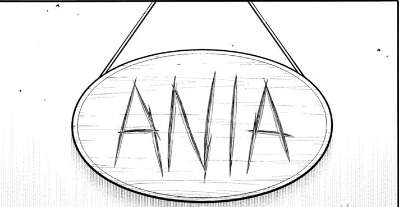
"Ania" is the chosen spelling. This could possibly mean that this is her real name and how it should be spelled (You, as the owner of your name have every right to decide what your name should be, spelled, or pronounced after all).
"Ania" could possibly be an influence of either her mother-tongue language's spelling.
"Ania" could possibly be due to her limitation of spelling. (I don't think she is aware of how her name should be spelled.)
Recall that Yor carved out Anya's name as "Ania" and didn't question it. This could be a reflection of Yor's own lack of familiarity of Ostanian orthography since she is academically limited, and she would have listened to how Anya would have wanted her name to be spelled. Furthermore, this tells me that Yor's absence of questioning reflects that she accepts her daughter no matter who she is, be it "Ania" or "Anya".
Third, I'd like to address "ANYA" as her name's spelling.
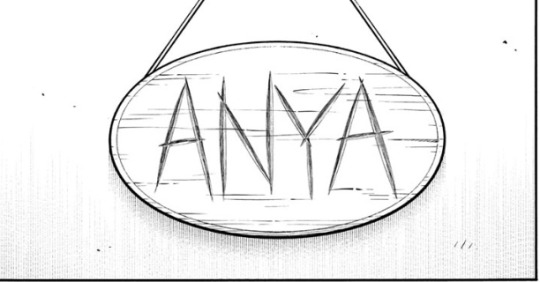
"A-N-Y-A" is the spelling that her papa gave her, which tells her that she can now be on the same playing field as her parents. Their names and titles are all "masks" in this masquerade that they call "Forger". So, to little Anya, it means that she finally belongs with someone. Anya has essentially found "her home".
We also know that Franky did do a lot of paperwork and found that "Anya" is the spelling that was written down on her adoption papers. This reinforces that "Anya" is the standard Ostanian orthography of her name.
I perceive Loid as a person replicating the "average Ostanian" (since this is a deep cover mission after all), so to also tell her that her name is spelled a certain way reinforces that she has a new identity as an "Ostanian child". (I find this quite ironically poetic because it's a "fake man" giving a "fake name" to his "fake daughter").
I also see that when Anya's eyes light up, it could also mean that this new identity in her spelling change meant she was finally liberated from her days as a lab experiment and living in an orphanage.
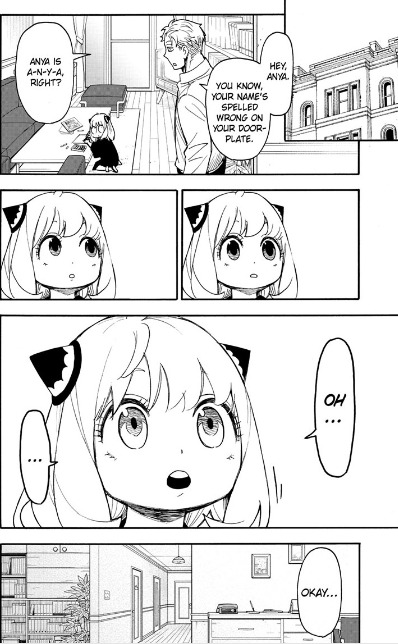
Fourth, I'd like to address spelling etymology.
Since I'm not a Japanese linguist expert, I found @connoisseursdecomfort post to be quite educational when it came to Japanese spelling.
What we learn from the above post is that "Ania" is an acceptable name spelling in "Old Japanese". But as time progressed, the spelling changed to "Anya" which is the modern-day spelling of this name (this may tie into Anya's character lore).
We can track "i" becomes "y" in the evolution of the alphabet from Phoenician (c. 1000 BC) to Archaeic Greek (c. 750 BC). S/O to @rachellysebrook for this link. (Again, what this reinforces is Anya's background with an unidentified mother country/mother tongue language).
Another thing is that Yor Forger did not react to the spelling of "Ania". It could possibly be that she recognized Anya's limitation, given that her daughter already had poor scores since her admission.
We also learned that Yor, a real Ostanian, seems to be limited with Ostanian orthography which is most likely due to her dropping out of school to take care of Yuri (fake Ostanian /j). From her interaction with Anya, off-screen, it appears that Yor seems indifferent to spelling standards of names (Which is nice! She is subtly against society's norm and I love her for that). Had she been aware of the spelling, she would have been the one to ask instead of Loid. (But again, it must be Loid because it's poetic and has a much more meaningful interaction between "Loid" and "Anya").
Fifth, I'd like to address the name's (possible) impact on character purpose in the story.
"Anya" means mother in Hungarian (S/O to @httplovecraft1890. This inspired my thoughts on "Ania" as a name in the lab). Could this possibly be an inspiration or coincidence? It could be a stretch, but perhaps Anya's purpose in the lab is that she's a "mother weapon" for war.
"Ania" means "gracious" and "merciful" according to Google. Which makes me think that the lab scientists went with this name because it would represent her purpose as a weapon of war. Perhaps Ania becomes the "truth serum" and could be seen as the "angel of death" because she knows the war captor's thoughts and inevitably they are executed (a possible headcanon).
Sixth, I'd like to discuss the factors of the mysterious "unidentified language".
Anya did use "oui" in the anime when Loid had adopted her. This automatically made me think her possible origins could be French, but it could also take another step back in the language family: Romance. What makes this work is that we treat "Classical Language" as a dead language based on what we read/saw in the manga/anime like Latin. Anya has an innate potential to be bi-/multilingual.

Bonus: Seventh, I'd like to talk about the languages in this anime (This is a bit of a ramble but since we're talking about linguistics, I thought why not)...
Based on the dialogues spoken in the anime, we can confirm that English exclamatory (Oh my God, Goddammit, Shit, Wow, Elegant, etc.) and the Japanese language are the main components of the Ostanian language. This is reinforced by many characters who have used English expressions (Loid, Yuri, Yor, Anya, Damian, Henderson, etc.)

What does bug me is whether or not "oui", a French exclamatory, should be categorized as part of the Ostanian language or if that should be categorized for Anya's hidden lore. The reason is that when Loid/Twilight heard Anya say "oui" in front of him, he did not question it. (Perhaps he was too tired to process this, or he excused it as something Anya could have seen on TV and is merely mimicking. I really don't think Twilight would be the type to excuse this realization had he not had the aforementioned state of mind). I'm leaning more towards the latter as this is from Anya's mother tongue language.
In conclusion (or tldr;): "Ania" may be her real name, but "Anya" is her new identity as part of the Forgers.
If you read everything, thank you for your time! The linguist in me is so happy that Endo-san is steeping his foot into linguistic territory. As short as this chapter was, it said A LOT to me linguistically and provided more details to the scraps of lore that we know of Anya but it also tells us a bit more about Yor, Loid/Twilight, and Ostania.
#spy x family#spy x family spoiler#spy x family chapter 90.1#Anya Forger#Ania#Anya#name analysis#manga chapter analysis#analysis#Spy x family Analysis#linguistics#orthography#loid forger#yor forger#scarlymadeathing#scarlydidathing#scarlywroteathing
303 notes
·
View notes
Text



Sanim script, revised.
For years my old conlang and conscript projects have been sitting in a file somewhere, copied over from computer to computer, but otherwise untouched. Lately I've found the motivation to revisit the old hobby, give it a fresh look, and perhaps try out some different approaches. (Also at some point I realized that creating interesting-looking scripts and writing systems was the part I enjoyed the most about creating conlangs, so that's the part I'm going to focus on going forward.)
I'm starting with Sanim, since it was the simplest script and the one that needed the least revisions. This time around I'm hoping to flesh it out more, beyond just the base letters — grammar, math, even different writing styles. Here's a handwritten sample:

Eventually I'd like to revisit all of the scripts I've made, and perhaps make some new ones? Maybe even return to the larger world-building project they were attached to, and some of the places and characters I left hanging. One step at a time, though.
(god it really has been over a decade, huh)
34 notes
·
View notes
Text
One of the fun benefits about being picky about formatting is that sometimes I see folks in the notes who clearly never learned that italics denote the proper title of a long-form work and are confused why I'm being so vehement about Batman.
3K notes
·
View notes
Text
As is well known*, the rule** for turning proper names that end in an "s" into possessives is that you add 's, unless the name is Jesus or Moses, in which case you just add an apostrophe. So "Jesus' tears" but "Harris's tears".
But I just hit an interesting edge case. What about people who are named "Moses" or "Jesus", but aren't the Moses or the Jesus? What's the rule there?
* By me and like three other people
** followed by me and like three other people
55 notes
·
View notes
Text
Introduction to Sarkezhe










It's week 4 of season 7 of LangTime Studio and this week we're introducing our season 4 language Sarkezhe: a conlang for cats! This is a vowel harmony language with noun classes and it's loads of fun. To watch our latest stream (today at 2 p.m. Pacific) you can follow this link:
248 notes
·
View notes
Text

21 notes
·
View notes
Text
Dhàzan'a Orthography
This post by @thecrazyneographist inspired the Dhàzan'a writing system. I'm not very creative when it comes to designing unique letter forms, so it uses combinations of markings to get full coverage of the phonology. I suppose that makes it a featural writing system.

30 notes
·
View notes
Text

It took a little longer than expected, but we got there! Lets talk about syllables, sounds, and the writing system.
The writing system is a syllabic alphabet, i.e. it has forms for individual letters corresponding to individual sounds, but they are arranged into blocks each corresponding to a single syllable. Let's take a look at an example, Kuembros.

If a syllable starts with a consonant, it goes on the left. The only consonant clusters in this language are formed with a plosive followed by an r, which is marked in the top left if present. The vowel(s) go in the top right. If there is a consonant at the end, it is written at the bottom connected to the initial consonant. Otherwise, a simple horizontal line takes its place.
Here are the consonants with their corresponding glyphs. Only m, n, and s may be at the end of a syllable. Their ending forms are shown underneath the table.
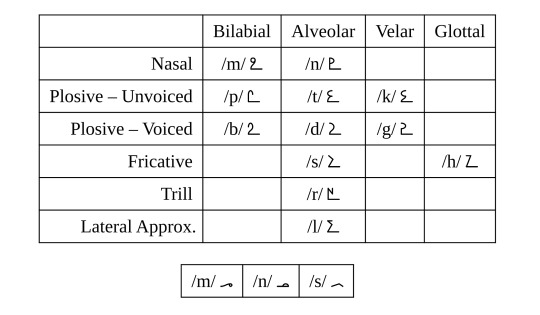
The first table below shows the plain vowels. This is the 5-vowel system. The second table shows the possible vowel combinations along with their typical realizations. Some of these are long vowels which are held for a greater duration (e.g. ā /aː/), some are diphthongs which glide from one vowel to another (e.g. /ai/ as in eye), and some starting with an i or u may be realized as a semivowel (y in you, and w in we respectively). Note that the IPA symbol for the English consonant y is /j/.
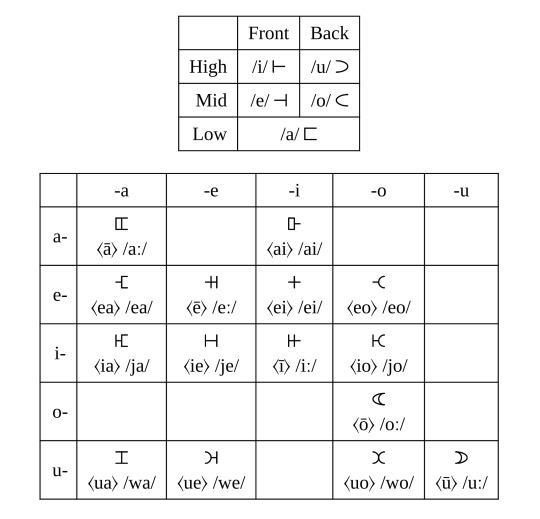
So there we have it. If you want to puzzle out some examples of the script, the banner at the top contains some randomly generated syllables of various forms.
Next up: People, Places and Things
#conlang#constructed language#artlang#neography#constructed script#orthography#conworld#worldbuilding#fantasy worldbuilding#Kvembrian#Kvember
19 notes
·
View notes
Text
im doing a survey/ study type deal on handwriting and i need data so like. id rly appreciate if yall participate :3 on paper. or digital if u wanna. but i heavily prefer handwriting on paper write in pen or pencil. whichever you prefer the sentence "Rogue gramma going to Google great gargantuan linguistics" make sure you capitalize Rogue and Google
102 notes
·
View notes